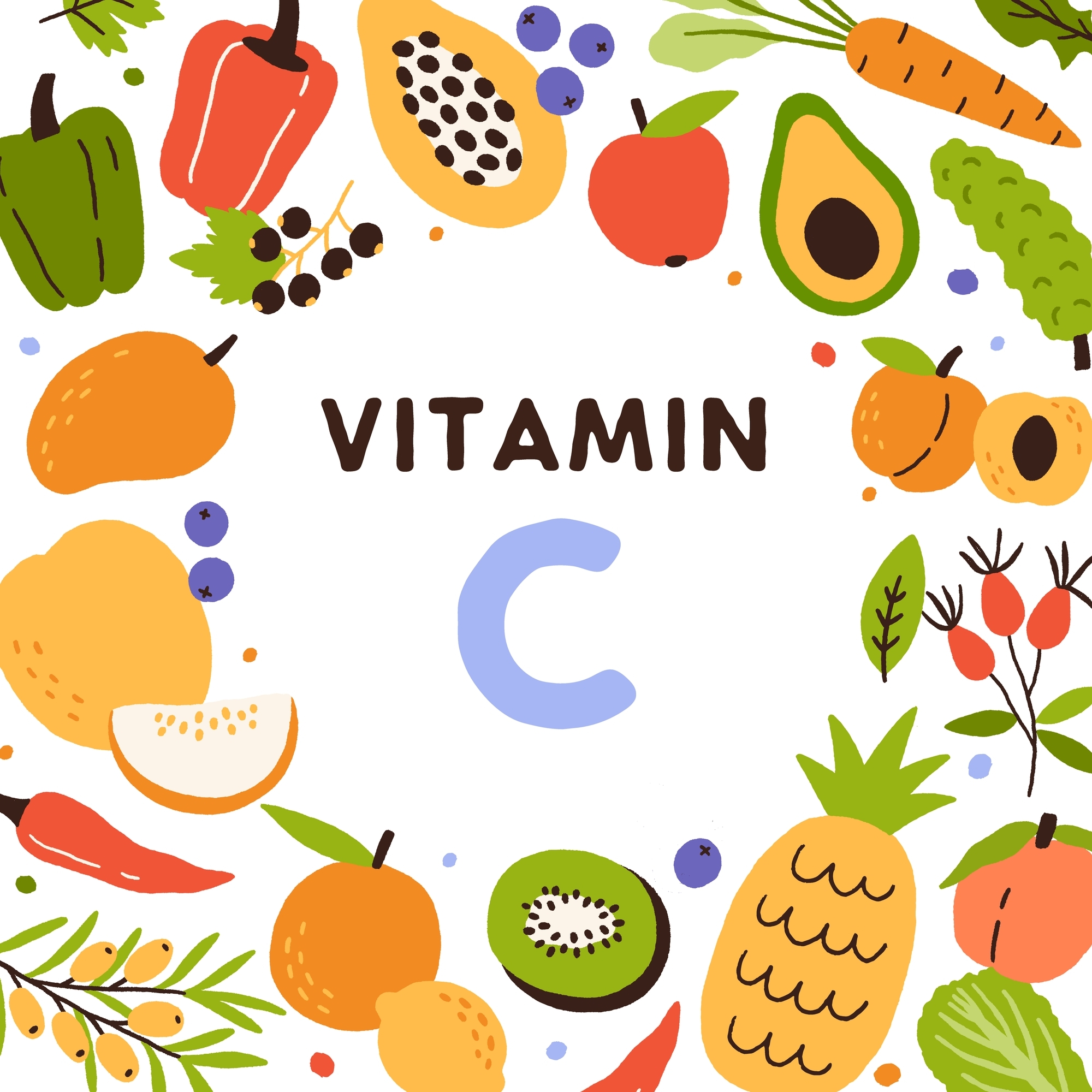
Abstract: Vitamin C has a lot of powerful antioxidant duties that are especially important during pregnancy. Vitamin C protects your body from oxidative damage and neutralizes reactive oxygen species, which can cause preterm birth and other pregnancy complications. This vitamin serves as a strong inflammation fighter, regenerates other antioxidants and improves the absorption of iron. It is a powerful contributor to immune health, working to repair tissues, heal wounds and synthesize collagen. Collagen is an essential component of connective tissue, helping to maintain healthy skin and establish healthy baby bones. Fresh fruits and vegetables are amazing sources of vitamin C and adequate amounts of this vitamin can be obtained from food alone. However, if necessary, supplementing with ascorbic acid is also beneficial.
What is Vitamin C? Why Do I Need It?
Fresh orange slices at soccer practice. A glass of orange juice. Tablets to help us fight a cold. Many of us, in our everyday lives, have discussed the benefits of vitamin C. Vitamin C is a very important water-soluble vitamin that needs to be consumed daily as it is not synthesized in the human body. The benefits of vitamin C are widespread, but it also plays a big role during pregnancy for proper baby development. As early as 1938, scientific researchers described the fetus as “acting as a parasite on the mother’s vitamin C pool”, due to the fact that the fetus is preferentially supplied with vitamin C at the expense of the mother. Several studies have reported that pregnancy in healthy women is associated with a significant decrease in maternal vitamin C status, perhaps partly due to increased blood volume in pregnancy. The developing fetus accesses vitamin C via specific transporters in the placenta and therefore relies on sufficient maternal supply throughout the gestational period. Our little developing babies require lots of vitamin C for normal fetal development and they aren’t afraid to take it from their mommas!
Vitamin C, or ascorbic acid, is an antioxidant that protects your white blood cells and your baby’s white blood cells from oxidative damage. It can prevent damage from numerous chemicals. For example, vitamin C is protective against the harmful effects of fluoride, PCBs, and mercury. Significantly, the vitamin may also help prevent or delay the development of certain cancers, cardiovascular disease, and other diseases in which oxidative stress plays a causal role. Research is continuing to look at vitamin C’s potential use in pregnancy to neutralize reactive oxygen species, which in turn, prevents fetal membrane weakening, preterm rupture of fetal membranes, and preterm birth.
As a powerful antioxidant, vitamin C is an effective inflammation fighter. High vitamin C diets should be prescribed for those that have inflammation of any kind, including endometriosis, PCOS, and unexplained infertility. This mighty vitamin also has the ability to regenerate other antioxidants, such as vitamin E, and improve the absorption of nonheme iron.
Vitamin C also plays a big role in immune health, promoting a healthy immune system and helping the body fight infections. Another benefit of vitamin C is wound healing and tissue repair. Vitamin C is involved in protein metabolism and the synthesis of collagen. Collagen is an essential component of connective tissue and plays a vital role in wound healing and maintaining healthy skin. Vitamin C works together with other amino acids and nutrients to maintain normal collagen production, which is important for your baby’s growth and to support mom’s tissues, such as a growing uterus and the skin of an expanding baby bump. Collagen is a structural component of connective tissues such as tendons, cartilage, blood vessels, bone matrix and corneas, making adequate vitamin C intake essential for healthy baby growth and development.
A contributor to a baby’s bone development, sufficient vitamin C levels lead to the healthy brain development of your baby, as well. The human brain has high vitamin C concentrations, which is indicative of the brain’s functional need for the vitamin. TETs are a family of epigenetic enzymes that depend on vitamin C for optimal catalytic activity. These enzymes function to modulate gene expression and coordinate complex processes such as cellular differentiation. More research on these enzymes will be able to further highlight the impact of nutrition on epigenetics in brain development and the programming of long term cognitive outcomes.
Lastly, adequate vitamin C levels are associated with a lower risk for some pregnancy complications including preeclampsia, preterm delivery, low birth weight infants, cardiovascular, pulmonary, hepatic and vertebral defects, and impaired hippocampal development. Studied Vitamin C supplementation during pregnancy to improve these outcomes has produced varied results and further research is needed. However, researchers have found that children born to women who eat plenty of vegetables (lots of natural vitamin C!) during pregnancy have a lower risk of developing Type 1 diabetes.
Am I Getting It From Food?

Yes! Fruits and vegetables are amazing sources of vitamin C. Citrus fruits, tomatoes and tomato juice, and potatoes are major contributors of vitamin C in the American diet. Other good food sources include red and green peppers, kiwifruit, broccoli, strawberries, Brussels sprouts, sweet potatoes and cantaloupe. Although vitamin C is not naturally present in grains, it is added to some fortified breakfast cereals. Sub-optimal freshness and cooking diminish the vitamin C content of produce, since ascorbic acid is water-soluble and destroyed by heat. Steaming or microwaving may lessen cooking losses. Fortunately, many fruits and vegetables are usually consumed raw. Consuming five varied servings of fruits and vegetables a day can provide more than 200 mg of vitamin C.
How Should I Get It?
Supplemental vitamin C is mainly in the form of ascorbic acid. Tests have shown that supplemental ascorbic acid has equivalent bioavailability to that of naturally occurring ascorbic acids in foods. Furthermore, a few studies have looked at the bioavailability of various forms of vitamin C. One form, called Ester-C produces the same vitamin C plasma concentrations as ascorbic acid 24 hours after ingestion. Another study found no differences in plasma vitamin C levels or urinary excretion of vitamin C among three different vitamin C types. Based on these findings and the relatively low cost of ascorbic acid, simple ascorbic acid seems to be the preferred source of supplemental vitamin C.
How Much?
As with most vitamins and nutrients, despite the established RDA (RDA for pregnancy is 85 mg/day) there are various opinions among health practitioners. The recommended daily intake in pregnancy is 105 mg/day in the EU. Low-income populations, pregnant women, pregnant smokers, and pregnant women with type 1 diabetes are at a greater risk for vitamin C deficiency and should expend extra efforts imploring a vitamin C rich diet of increased fruits and vegetables. Extensive evidence supports an optimal vitamin C intake of at least 200 mg/day with 400 mg/day required to reach near-maximal plasma vitamin C levels.
Prenatal Vitamin Brands: What's the Vitamin C Amount and Type in Popular Prenatal Brands?
| Name of the Prenatal | Amount | Type |
| Parsley Health Prenatal: | 100 mg | (ascorbic acid) |
| Modern Fertility Prenatal: | 85 mg | (ascorbic acid) |
| Ritual Prenatal: | No Vitamin C | N/A |
| FullWell Prenatal: | 275 mg | (ascorbic acid) |
| Perelel: Conception Support and All Trimesters Pack: | 50 mg | (ascorbic acid) |
| NatureMade Prenatal Multi + DHA: | 85 mg | (ascorbic acid) |
| Seeking Health: Optimal Prenatal: | 350 mg | (ascorbic acid) |
| Designs for Health: Prenatal Pro: | 400 mg | (ascorbic acid) |
Prenatal Analysis:
Depending on your deficiency risk profile and how heavy your diet is with fresh fruits and vegetables, you may choose one of the prenatal vitamins with high amounts of supplemental vitamin C. However, if you are confident in your diet’s inclusion of fresh fruits and vegetables consistently, a prenatal vitamin with a supplemental amount of vitamin C closer to the RDA amount or less is sufficient.
References:
- Nichols L. Real Food for Pregnancy: The Science and Wisdom of Optimal Prenatal Nutrition. First edition. Lily Nichols; 2018.
- Avena NM, Fear G. What to Eat When You’re Pregnant: A Week-by-Week Guide to Support Your Health and Your Baby’s Development during Pregnancy. First edition. Ten Speed Press; 2015.
- Murkoff HE, Mazel S. What to Expect When You’re Expecting. Fifth edition. Workman Publishing; 2016.
- The Optimal Fertility Diet. Aviva Romm, MD. Published August 11, 2020. Accessed April 20, 2022. https://avivaromm.com/the-optimal-fertility-diet/
- Vitamin C - Health Professional Fact Sheet. Accessed April 20, 2022. https://ods.od.nih.gov/factsheets/VitaminC-HealthProfessional/
- Mercer BM, Abdelrahim A, Moore RM, et al. The impact of Vitamin C supplementation in pregnancy and in-vitro upon fetal membrane strength and remodeling. Reprod Sci Thousand Oaks Calif. 2010;17(7):685-695. doi:10.1177/1933719110368870
- Jang W, Kim H, Lee BE, Chang N. Maternal fruit and vegetable or vitamin C consumption during pregnancy is associated with fetal growth and infant growth up to 6 months: results from the Korean Mothers and Children’s Environmental Health (MOCEH) cohort study. Nutr J. 2018;17(1):105. doi:10.1186/s12937-018-0410-6
- Juhl B, Lauszus FF, Lykkesfeldt J. Poor Vitamin C Status Late in Pregnancy Is Associated with Increased Risk of Complications in Type 1 Diabetic Women: A Cross-Sectional Study. Nutrients. 2017;9(3):186. doi:10.3390/nu9030186
- Safety and efficacy of supplements in pregnancy | Nutrition Reviews | Oxford Academic. Accessed April 20, 2022. https://academic.oup.com/nutritionreviews/article/78/10/813/5700577